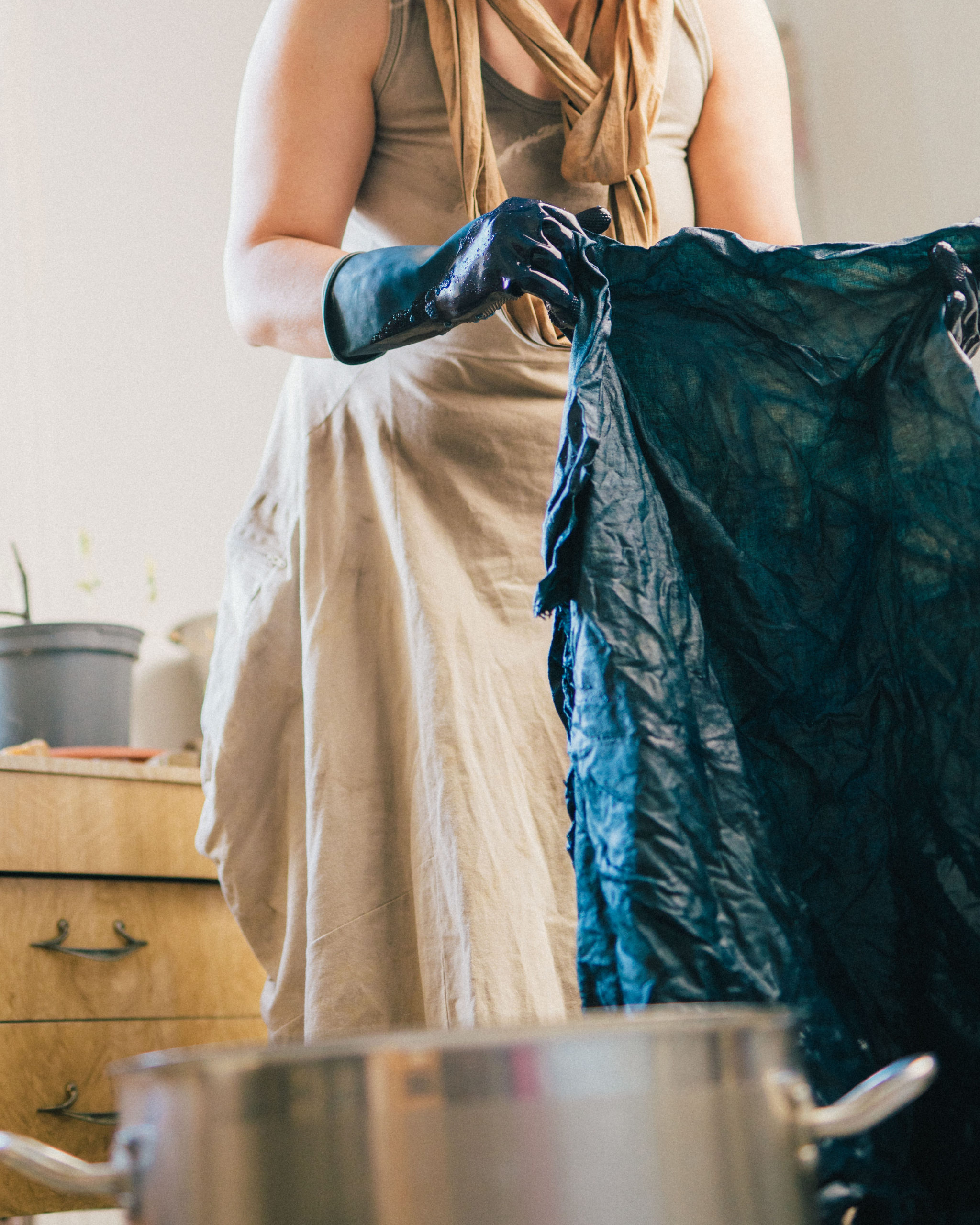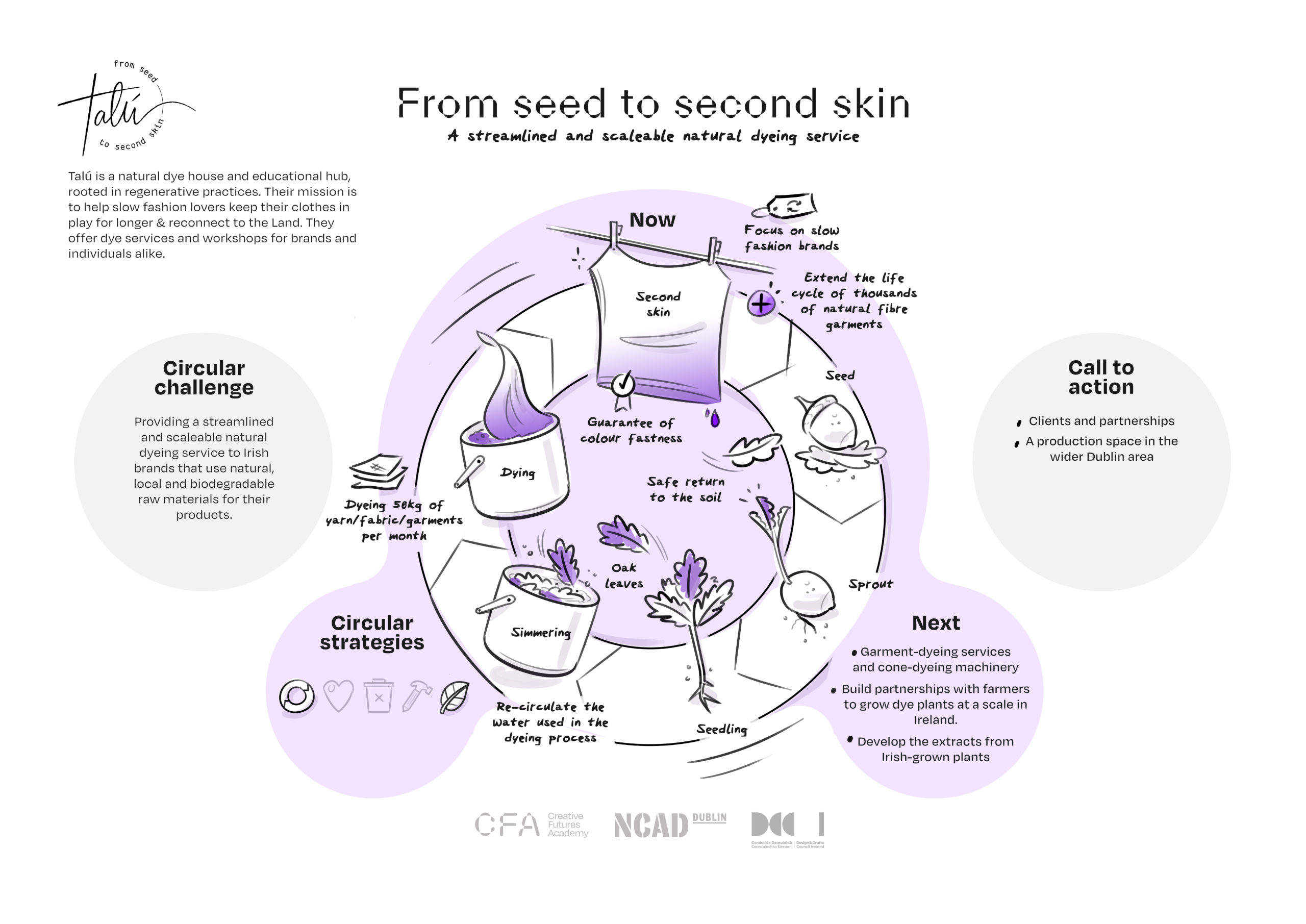Talú
Talú is a natural dye house and educational hub, rooted in regenerative practices. Their mission is to help slow fashion lovers keep their clothes in play for longer & reconnect to the Land. They offer dye services and workshops for brands and individuals alike.

From Seed to Second Skin
The circular challenge:
20% of freshwater pollution is attributed to the use of synthetic dyes and finishes (Kant, R., ‘Textile dyeing industry: An environmental hazard’, Natural Science, Vol. 4, 1 (2012), p.23).
A key element that helps ensure compostability for textiles is avoiding the use of synthetic dyes. Natural dyes from plants, insects and minerals are an excellent alternative with a tried and tested track record, historically.
Many Irish brands, including fellow pilot participant LA Knitwear, are trying to use natural, local and biodegradable raw materials for their products. The niche for providing natural dye services to brands is underserved in Ireland, but the interest from both brands and consumers is growing.
The circular design strategy:
- Design for Cyclability
- Design from Safe, Renewable and Recycled Materials
The NOW Solution: What circular solution was prototyped and what are the companies short-term circular goals?
Talú are currently developing a streamlined and scaleable natural dyeing service for slow fashion brands. In the short-term, this involves getting their test swatches professionally tested for colour fastness. They are also looking to implement a rainwater-catchment system and a way to re-circulate the water used in the dyeing process.

What were the main hurdles and lessons learnt from your prototyping phase?
Through surveys & research gathered in the prototyping phase, Talú learned that their potential clients need clear communication & reassurance on the entire dyeing process in order to commit their products, as well as a prior guarantee of colour fastness, either through certification or third-party testing.
They have also been limited by logistical difficulties created by the recent loss of their core studio & production space. They are currently looking for a studio space or small industrial unit of at least 25m2 with parking space and plumbing in either Dublin, Wicklow or Kildare.
The NEXT Solution: What are your bigger / longer-term circular goals for your brand?
Talú’s goal is to develop an efficient natural dyeing service for industry from Irish plants & through regenerative practices. For this they need to:
- Obtain garment-dyeing and cone-dyeing machinery to streamline and scale their processes.
- Build partnerships with farmers who can grow dye plants at a scale in Ireland, using regenerative practices.
- Develop dye extracts from Irish-grown plants, both for in-house use and for wholesale.
In the long-term, they also hope to found their own farm locally to educate brands, manufacturers and the public on the process of yarn growth and production, and plant dyeing.
Projected future impact: What is the expected positive impact - environmental, economic, social - from your longer term circular solution.
Talú’s goal for the next three years is to be dyeing at least 50kg of yarn/fabric/garments per month. Their planned dyeing service will extend the life cycle of thousands of natural fibre garments before redirecting them from landfill by facilitating their safe return to the soil.
In the next five years they hope to regularly employ at least 10 people in fulfilling work in their circular business model.
As pioneers of such a dyeing service in Ireland, they will lead by example and expect to see demand for naturally-dyed garments increase exponentially, with the infrastructure they create inspiring and incentivising bigger brands & dye houses to adopt natural dyeing techniques.
What questions or uncertainties are you facing right now in terms of your circular development?
- Will there be enough interest to financially sustain this model?
- Will there be concerns from the EPA or the planning authorities when scaling up, regarding water effluent?
Call to Action:
To move from prototype to pilot, Talú is looking for the following:
- Clients, particularly brands interested in offering naturally dyed garments to their customers
- Funding and partnerships that align with Talús circular commitments
- A production space in the wider Dublin area
Website or platform of choice you'd like us to direct our audience to, to keep up to date on your brand.
Website: https://talu.earth


